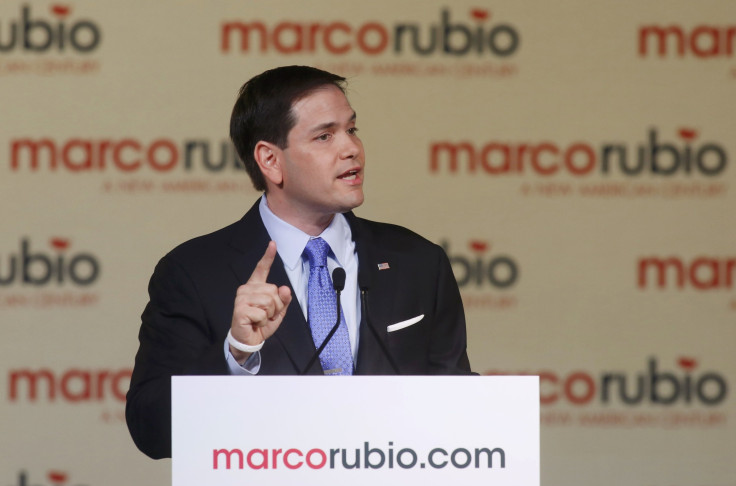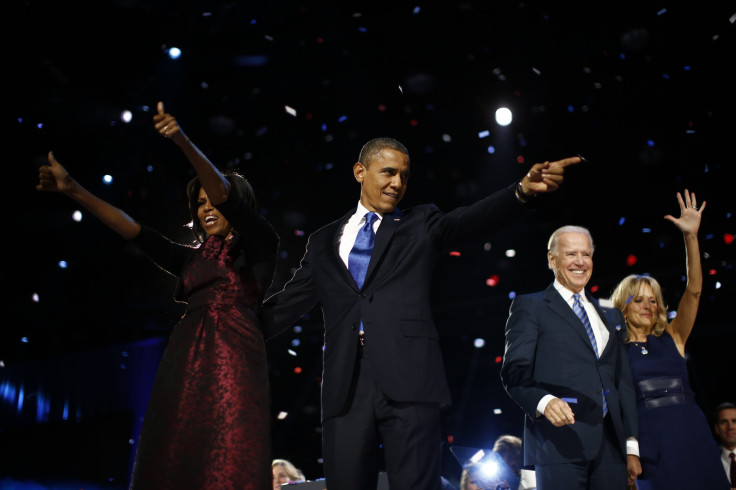Marco Rubio's 'Sanctuary City' Law And The 2016 Election: Can Republicans Win Without Latino Voters?

When Kate Steinle, a young, white woman, was shot on a San Francisco pier by an undocumented immigrant in July, Republican presidential candidates responded with outrage. Undocumented immigrants are often criminals, Republican presidential front-runner Donald Trump had been saying, and Steinle's death was cited as proof.
Among the GOP leaders who subsequently launched a war against sanctuary city policies like the one embraced by San Francisco, Florida Sen. Marco Rubio vowed to end federal funding for local governments that don't comply with federal immigration laws. The harsh rhetoric marked a sudden shift for Rubio, a leading Republican presidential candidate who was once seen as the new diverse face of the GOP and a link to the nation's increasingly important Hispanic voters.
As the Senate debated sanctuary city policies Tuesday, and Rubio's anti-immigrant campaign could have lasting ramifications for the GOP. With Rubio looking to win over far-right Republican voters by going after undocumented immigrants with criminal records, appearing anti-Hispanic could hurt his party’s chances with Latinos in 2016, an increasingly valuable voting bloc that played an important role in President Barack Obama’s re-election in 2012, pundits said.
“If you go back to right after the 2012 elections you had many Republican Party leaders, even conservatives like Bill O’Reilly or Sean Hannity, saying they backed amnesty,” said Karthick Ramakrishnan, a professor of political science at the University of California, Riverside. “You had a fair number of Republicans who read the verdict of the 2012 election as saying they needed to back a pathway to citizenship."
Rubio was one of those Republicans as part of the so-called “Gang of Eight” in the Senate who put together a comprehensive immigration plan in 2013 that would have provided a pathway to citizenship for undocumented immigrants and beefed up border security. His involvement helped propel him to a position of importance, especially since he was a young, Hispanic Republican some saw as the potential future of the party.
Conservative activists rallied against the Senate bill, and congressional leadership gave up on the issue after it stalled in the House. Rubio, too, eventually backed away from supporting a pathway to citizenship, focusing his efforts instead on supporting border security measures, a topic that has resonated with far-right Republican primary voters and has been the focal point of 2016 Republican presidential contest.

More recently, Rubio and Sen. Ted Cruz of Texas, a fellow presidential candidate, have co-sponsored a bill being considered in the Senate that would redirect funds away from cities that do not comply with federal immigration requests. The anti-sanctuary city bill came up for debate in the Senate Tuesday and is opposed by Democrats.
“Kate Steinle's murder tragically exposed the dangers of an inconsistent and ineffectual immigration enforcement policy, which encourages flagrant violations of our laws,” Rubio wrote in a press release that accompanied the bill’s introduction. “We need to fix our broken immigration system, but we can't do it as long as the belief persists that our immigration laws can be violated without any consequences.”
Some Latino activists say Republican rhetoric paints an otherwise diverse voting bloc with a broad brush, forcing factions together in opposition to the GOP. “You cannot be approaching someone about how you’re going to get them a job when you’re talking about deporting their grandma,” said José Parra, a Democratic strategist at Prospero Latino, a strategic consulting firm that works to help clients communicate with Hispanic Americans.
Others, however, question how important Latino voters really will be for Republicans in 2016. “It’s not the apocalypse yet. Yes, it’s a legitimate long-term question: How do you integrate those folks as a part of the conservative coalition?” said Rick Wilson, a Florida Republican strategist working on Senate campaigns. Wilson, is unconvinced 2016 candidates need to tout immigration reform plans, but rather that Republicans need to speak to Latino voters without the vitriol he sees coming from Trump. "You don't have to treat people that way. You shouldn't."

Obama won handily with Latino voters in 2012 over Republican nominee Mitt Romney. In states like Florida, Nevada and Colorado, three important swing states with large Latino populations, Obama's appeal to Hispanic voters likely decided the election. Florida Hispanic voters preferred Obama 60 percent to 39 percent. Nevada Hispanic voters preferred Obama 70 percent to 25 percent. Colorado Hispanic voters chose him 75 percent to 23 percent.
Obama's victory made it clear to many Republicans the Hispanic vote couldn't be ignored. Latinos are the fastest growing minority group in the country, and, while they tend to support Democrats, social conservative values shared by both Republicans and Hispanics have led some to believe the GOP could convince those voters to switch sides. That is different from African-American voters, who vote almost unanimously for Democrats. President George W. Bush won 40 percent of the Hispanic vote in the 2004 election.
Because of a growing Hispanic population, Republicans would need to win 47 percent of the Latino vote to take the White House in 2016, research indicates. That figure comes from two sources: a pollster at UCLA and the pollster who has been tapped by Rubio’s campaign.
Republican presidential candidates need “to start approaching what George W. Bush did in 2004, if not improve on that,” Ramakrishnan said.
Latino voters care most about issues like the economy, healthcare and foreign policy, but immigration positions can still influence a race. “Immigration is not the only issue Latino voters care about," Ramakrishnan said. "But, immigration is the kind of issue that is often seen as a sign of respect toward the Latino community. So, if someone is taking a harsh stance on immigration it will hurt the party. It will hurt the candidate.”
© Copyright IBTimes 2024. All rights reserved.












